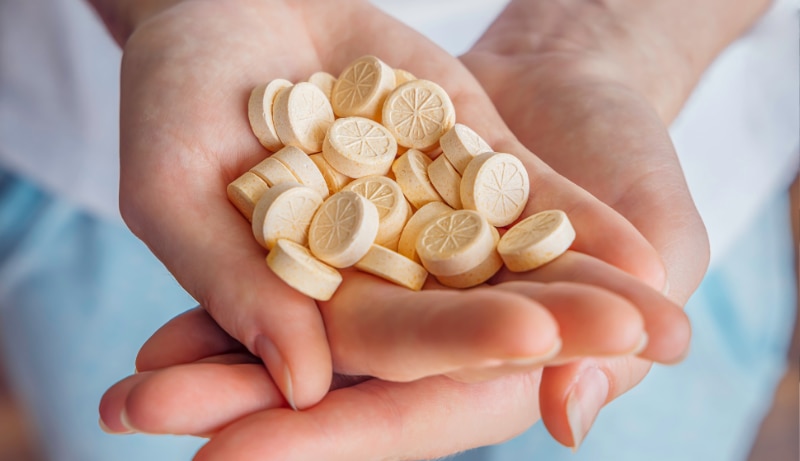15% off £30 OR 20% off £40
10 science-backed benefits of ascorbic acid & uses

Ascorbic acid is incredibly important for helping keep our bodies and skin healthy. But what is it?
While you might think you don’t know that much about it, you may be surprised that pretty much everyone does (clue: it goes by a different name)...
Skip to:
What is ascorbic acid & what does it do?
Ascorbic acid is, in fact, vitamin C.
It’s used by our bodies to make collagen, which plays a key role in the development and maintenance of our skin, bones, teeth, and cartilage.1
The NHS says vitamin C (ascorbic acid) is essential for:2
- Helping to protect cells and keeping them healthy
- Maintaining healthy skin, blood vessels, bones, and cartilage
Over time, not having enough vitamin C can, lead to a condition called scurvy (severe vitamin C deficiency) that can cause symptoms, such as bleeding from the gums, bruising, and joint and muscle pain.3
Fortunately, it’s possible to get all the vitamin C we need from our diet. The best sources of it can mainly be found in fruit and veg.
Summary:
Ascorbic acid is another name for vitamin C. It’s used by our bodies to make collagen, which plays a key role in the development and maintenance of our skin, bones, teeth, and cartilage.
Ascorbic acid uses and benefits
Now that you know the basics of what ascorbic acid is, let's move on to its benefits for the body.
What are the benefits of ascorbic acid?
-
Vitamin C deficiency
As mentioned above, ascorbic acid is usually given to help people increase their vitamin C levels. You’re most likely to be vitamin C deficient if:
- You eat a limited diet
- You have severe malabsorption
So too are smokers, due to the fact smoking increases the amount of vitamin C the body needs to repair damage caused by free radicals.
The NHS recommends adults get 40mg of vitamin C daily. Those who smoke need 35mg more a day – however, this is according to guidelines from the US.² ⁴
-
Collagen production
When applied topically, vitamin C can boost your skin’s appearance and help keep skin plump and firm. Topical vitamin C can help support healthy skin ageing and help achieve a more youthful, smooth appearance.
-
Iron absorption
Not only is vitamin C useful in itself, but it can enhance the way other nutrients work.
Vitamin C helps to increase absorption of non-heme iron (the type of iron we get from plant-based foods, like leafy greens). ⁵
Non-heme iron is a little more difficult to absorb than heme iron (the type of iron we get from meat and fish), so this is particularly important if you’re vegetarian or vegan.
When you eat a plant-based, iron-rich meal, try to include a food containing vitamin C at the same time - it’ll help your body take in as much of it as possible. ⁵
-
Skin hydration
Without vitamin C, the epidermis (top layer of skin) starts to dry out, which can lead to itchy, scaly skin, and signs of ageing like dryness, skin thinning, and fine lines.
Hydration is vital to keeping your skin healthy and youthful looking. Fortunately, vitamin C is clinically proven to help skin retain water, keeping it plump and smooth and preventing it from becoming too oily or dry. ⁶
Other benefits and uses include:
- Reducing skin redness to create an even complexion (if applied topically) ⁷
- Improving the appearance of hyperpigmentation, by fading abnormal melanin deposits caused by UV damage (if applied topically) ⁷
- Preventing dark undereye circles from forming (if applied topically) ⁸
Are ascorbic acid and vitamin C the same?
Yes! Ascorbic acid is a form of vitamin C.²
Ascorbic acid is the general term for all forms of vitamin C. L-ascorbic acid is synthetically made, but it’s identical to “natural” vitamin C. It’s usually used as a dietary supplement when people aren’t getting enough of it from their diet alone.
Low vitamin C levels can occur if people a) aren’t eating enough vitamin C-rich foods, or b) they have intestinal malabsorption problems, which may impact their body’s ability to take in ascorbic acid.
What’s more, vitamin C cannot be stored in the body, which is why it’s so important to incorporate it in your diet as much as possible.²
Can you buy vitamin C without ascorbic acid?
Most supplements use ascorbic acid as their available form of vitamin C. But it’s possible to buy vitamin C that doesn’t contain it.
Vitamin C and ascorbic acid both contribute to your daily vitamin C intake, but some people find that ascorbic acid irritates their gut.
If you want to avoid ascorbic acid, look instead for:
- Sodium ascorbate: However, you should avoid this alternative if you’re on a low-salt diet.
- Calcium ascorbate: According to a 2018 study on rats, sodium ascorbate offers the same benefits as ascorbic acid with less gastrointestinal irritation. ⁹ Plus, including calcium can help to improve bone health.
- Ascorbic acid with bioflavonoids: This also reduces gastrointestinal irritation, and one study from 1988 suggested that an ascorbic acid blend with additional bioflavonoids (amongst added proteins and carbohydrates) may improve vitamin C absorption by up to 35%. ¹⁰
Is ascorbic acid bad for you?
Is ascorbic acid bad for you?
As is generally the case with all supplements, ascorbic acid powders and tablets are safe to take if you follow the manufacturer’s guidelines and NHS guidelines, and take the right dosage based for you (more on dosages shortly).
If you’re planning to take ascorbic acid, speak to your GP to make sure it’s okay for you to do so and that you take the right amount based on your specific health needs.


Ascorbic acid dosing
How much ascorbic acid is safe to take?
Vitamin C (ascorbic acid) can be taken orally, applied topically to the skin, injected into muscles, or given intravenously.
According to NHS guidance, adults aged between 19 and 64 need 40mg of vitamin C a day.²
Taking more than 1000mg a day is potentially unsafe and may cause kidney stones, as well as severe diarrhoea.
It’s recommended people who have had kidney stones in the past shouldn’t take more than 1,000mg of ascorbic acid a day; anything higher could potentially lead them to develop kidney stones again. ¹¹
When should I take ascorbic acid?
Unless your GP or the instructions say otherwise, you can take ascorbic acid at any time of day. It’s best to pick a time when you’re most likely to remember, either before or after meals.
If you’ve been instructed to take a higher dose, i.e., more than 250mg, you may be advised to split it into divided doses.
Make sure you are clear on when and how much ascorbic acid to take before you start taking it, as not taking the correct amount may lead to you experiencing one or more side effects.
Ascorbic acid side effects and risks
Ascorbic acid side effects and risks
When taking a new supplement, it's important to be aware of any side effects and risks you might be exposing yourself to.
It's possible to experience some side effects as a result of taking ascorbic acid. Common side effects include
- Diarrhoea
- Sickness
- Heartburn
- Fatigue
- Flushing
- Headaches
- Difficulty falling asleep or staying asleep
- Flatulence
Taking large amounts of ascorbic acid, e.g., more than 1,000mg a day, increases the likelihood of experiencing diarrhoea, flatulence, and stomach pains.2


What are the risks associated with taking ascorbic acid?
On the whole, there are minimal risks associated with taking ascorbic acid.
However, i’s not recommended to take more than 1000mg per day, as the Department of Health and Social Care (DHSC) cannot confirm that this is safe.²
You should always consult your GP before taking a new vitamin or supplement such as vitamin C, even if you are otherwise healthy.
To conclude…
To conclude…
Ascorbic acid does a lot of good for us, but it’s something we must continuously replenish because it’s not stored in our bodies.
Eating a diet that’s full of fruit and veg should give you all the vitamin C you need. But, if you’re already deficient or are suffering from malabsorption, then you may need to take an ascorbic acid supplement.
Speak to your GP if you are concerned about your vitamin C levels and believe you may need to take a supplement.


Last updated: 12 January 2023
- https://patient.info/medicine/ascorbic-acid-tablets
- https://www.nhs.uk/conditions/vitamins-and-minerals/vitamin-c/
- https://www.nhs.uk/conditions/scurvy/
- https://www.winchesterhospital.org/health-library/article?id=14069
- https://www.hsph.harvard.edu/nutritionsource/iron/
- https://www.ncbi.nlm.nih.gov/pmc/articles/PMC5579659/
- https://www.verywellhealth.com/vitamin-c-for-skin-5084225#benefits
- https://pubmed.ncbi.nlm.nih.gov/19626722/
- https://pubmed.ncbi.nlm.nih.gov/29302210/
- https://pubmed.ncbi.nlm.nih.gov/3414575/
- https://www.nature.com/articles/nrneph.2013.29















